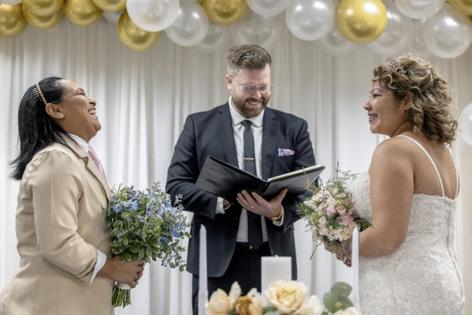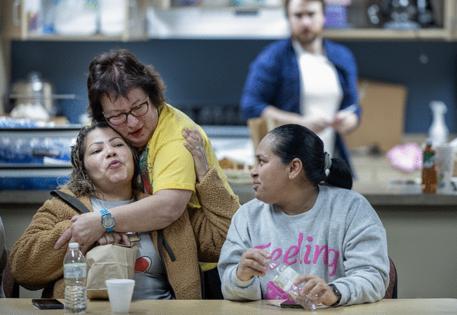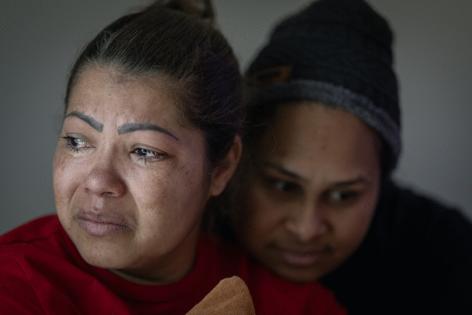She survived the long trek from Venezuela to Minnesota. Then she was diagnosed with breast cancer
Published in Lifestyles
MINNEAPOLIS -- The pain started while Miriam Orta pushed carts as a hotel housekeeper in Woodbury, Minnesota. She found the sudden aches in her back and shoulder surprising: Orta had worked as a welder in Colombia and her native Venezuela without incident, and just survived a grueling journey to America seeking asylum.
She was scared to go to the doctor — she had no health insurance. When Orta finally went to La Clinica in St. Paul, a doctor diagnosed her with breast cancer.
Orta, 39, returned to the hotel where she and her girlfriend, Liseth Juarez Valera, 45, worked.
“I struggled so much to get here, and now I’m getting sick,” Orta said.
Valera hugged her. She said to calm down.
“After all the trek we had just done … I’m going to die,” Orta said.
The two women had known one another since they were girls in Venezuela, when their fathers did repair jobs at one another’s homes. (They agreed to tell their story on the condition that only their partial names be published as they seek asylum.)
Orta liked that Valera spoke her mind, saying, “She was an extrovert and spontaneous.” Valera admired that Orta’s welding job was one that women usually didn’t do. “She seemed very tough,” Valera said.
They became a couple in 2020 but kept their relationship a secret; being openly gay can be dangerous in Venezuela, where same-sex marriage is illegal.
The following year, Valera’s brother migrated from Venezuela to St. Paul after facing threats for not following orders in the military and disagreeing with President Nicolás Maduro’s politics. Her brother reported that as difficult as it was to find a job and not speak English, it was still easier than life in Venezuela. He secured temporary protected status (TPS). Valera and Orta started their journey north in February 2024, joining hundreds of thousands of other Venezuelans fleeing political repression, violence and economic hardship.
Arriving in Minnesota
The couple journeyed in the rain through the Darién Gap, the perilous jungle region linking Colombia and Panama. They took buses, paid guides and walked across Central America. Along the way Orta and Valera pretended they were sisters, scared of retribution if they said they were in a relationship. In Mexico, Orta took a job in construction when they ran out of money, defying the crew’s reluctance to hire a woman.
They followed the Biden administration’s instructions that migrants turn themselves in at a port of entry by making an appointment through the CBP One app. Last July, Orta and Valera entered the U.S. After they were photographed, fingerprinted and questioned, they were approved for work permits and given a notice to appear in immigration court.
Upon arriving in St. Paul, they stayed with Valera’s brother, his wife and child for a month. He lent them money to rent a place of their own. He also bought them a used car so they could work as DoorDash drivers until they found steady jobs. To furnish their new home, Orta and Valera found a turquoise couch on a curb and loaded it into the van. Someone donated a bed.
The couple quickly found jobs in Woodbury as hotel housekeepers for $16 an hour.
Then came the cancer diagnosis — months after the couple arrived in their new country.
Orta was scared to hear the doctor say the word mastectomía.
Through La Clinica she met Julissa Rios, a longtime case manager at the clinic. Rios applied on Orta’s behalf for Emergency Medical Assistance (EMA), a longtime state program that covers cancer treatment for low-income undocumented immigrants. EMA provides coverage for those whose immigration status would otherwise bar them from accessing similar services under Medicaid, but does not cover reconstruction, physical therapy or follow-up appointments.
“I think God put her in my path,” Orta said of Rios. “I was very worried because everything that they were doing on a medical level I didn’t think I could afford it, and she eased that worry in me and said she’s going to do everything possible to help out.”
Valera keeps photos of Orta getting ready for the October operation at Regions Hospital. She’s wearing a white tank top, then a hospital gown, sitting on the bed. The surgery to remove Orta’s left breast was successful. The cancer, discovered in its early stages, was gone.
Rios invited Orta to a support group, La Nueva Esperanza, which brings together immigrant cancer survivors once a month in a basement room at La Clinica. At first, Orta found it difficult to open up. Yet the more she spoke, the easier it became.
“It’s been a good place for me to get that kind of support from people who are going through the same thing,” said Orta.
Fighting cancer together
At La Nueva Esperanza, Orta was moved by the words of a Mexican immigrant named Juanito. He said God — not the doctor — will tell him when his life is over.
Juanito, a 14-year McDonald’s employee, has undergone numerous rounds of chemo since 2019 — treatments that his insurance didn’t cover.
“I feel better when I’m there because sometimes it’s nice to talk to others — I’m alone all the time here,” said Juanito, who asked that his last name not be published since he’s lived in the U.S. without legal status for two decades.
Juanito said it was the support group members’ laughter that helped him the most.
“Don’t let cancer defeat you,” they tell one another.
Rios founded the support group 20 years ago after seeing newly diagnosed patients asking for help. They had no health insurance, and because they often lacked legal status, they did not qualify for most resources. Rios started collecting information, distributing welcome kits and helping them apply for Emergency Medical Assistance.
She noted that migrants may carry trauma that inhibits their treatment: Some women who were raped on their journey to the U.S., for instance, are afraid to get a pap smear to monitor for cancer.
The group talks about immigration lawyers, vaccines, nutrition and exercise. Rios has observed that members are wary of discussing depression. She said it’s taboo in Latino culture, and people don’t want others to know they are suffering.
Toasting to love
At the group’s Thanksgiving party, one of the prizes was an engagement ring. Valera raised her hand and told Rios that she wanted it.
She proposed to Orta in front of everyone, and Orta said yes. They held the ceremony at a meeting of the support group earlier this year.
“They decided to try, like many of their fellow Venezuelans, to immigrate to the United States to take a new chance at life, a new hope,” Rios told the gathered friends.
She recounted their dangerous journey to reach the U.S., and then Orta got the cancer diagnosis “that changed their lives … once more.”
“Three months after that diagnosis of cancer,” Rios said, “today we’re gathering here because Orta and Valera have decided to join their lives, because all that journey through nine countries and the journey to fight cancer was not able to separate them.”
The group clapped and cheered as Orta entered the room and walked down the aisle. She carried flowers and wore a tan suit and pink tie. After a few more remarks, everyone stood and clapped as Valera came in wearing a long white wedding dress.
The women recited that love is patient and kind. They promised to love and respect each other all the days of their lives.
The two exchanged rings and smiled proudly. Each held a bouquet of flowers. They lit a candle, and Orta fed Valera a piece of cake.
“Let’s toast to the love and support that all of you have brought for Miriam and Liseth. … I know all the people here have had a difficult path, but … if we support each other, it’s way easier,” said Rios.
“Salud!” everyone said as they raised their glasses.
Orta and Valera know their troubles are not over. They are working with an attorney on their asylum case; their first court date is in November. They’re still trying to make a living: Orta started work as a cook at a day care, while Valera picked up a night shift at a tortilla factory.
The couple fielded distressed calls from Valera’s 19-year-old son, who was waiting in Mexico for his CBP One appointment to join them when Donald Trump was elected president. The administration turned the app into a self-deportation tool; Valera’s son returned to Venezuela at his mother’s urging. And the administration just sent termination notices to some CBP One beneficiaries telling them to leave the country, but it’s unclear how that will affect the couple.
Meanwhile, her brother is one of many Venezuelans whose TPS status was set to expire this month, though a federal judge recently paused the Trump administration's efforts to revoke those protections. He noticed that Valera still keeps her shabby green shoes from the journey north and has urged her to get rid of them. But Valera can’t bring herself to throw them away.
Valera and Orta returned to the support group in March. Visiting speaker Erika Ortiz, CEO of the PyschoLove Institute, gave a talk about resilience. She led three dozen participants in a meditation as they gathered around a U-shaped table listening to serene melodies. She then led the group in the soothing tones of sound therapy.
In those moments, Orta and Valera forgot their worries, and let themselves relax.
©2025 The Minnesota Star Tribune. Visit at startribune.com. Distributed by Tribune Content Agency, LLC.





























Comments